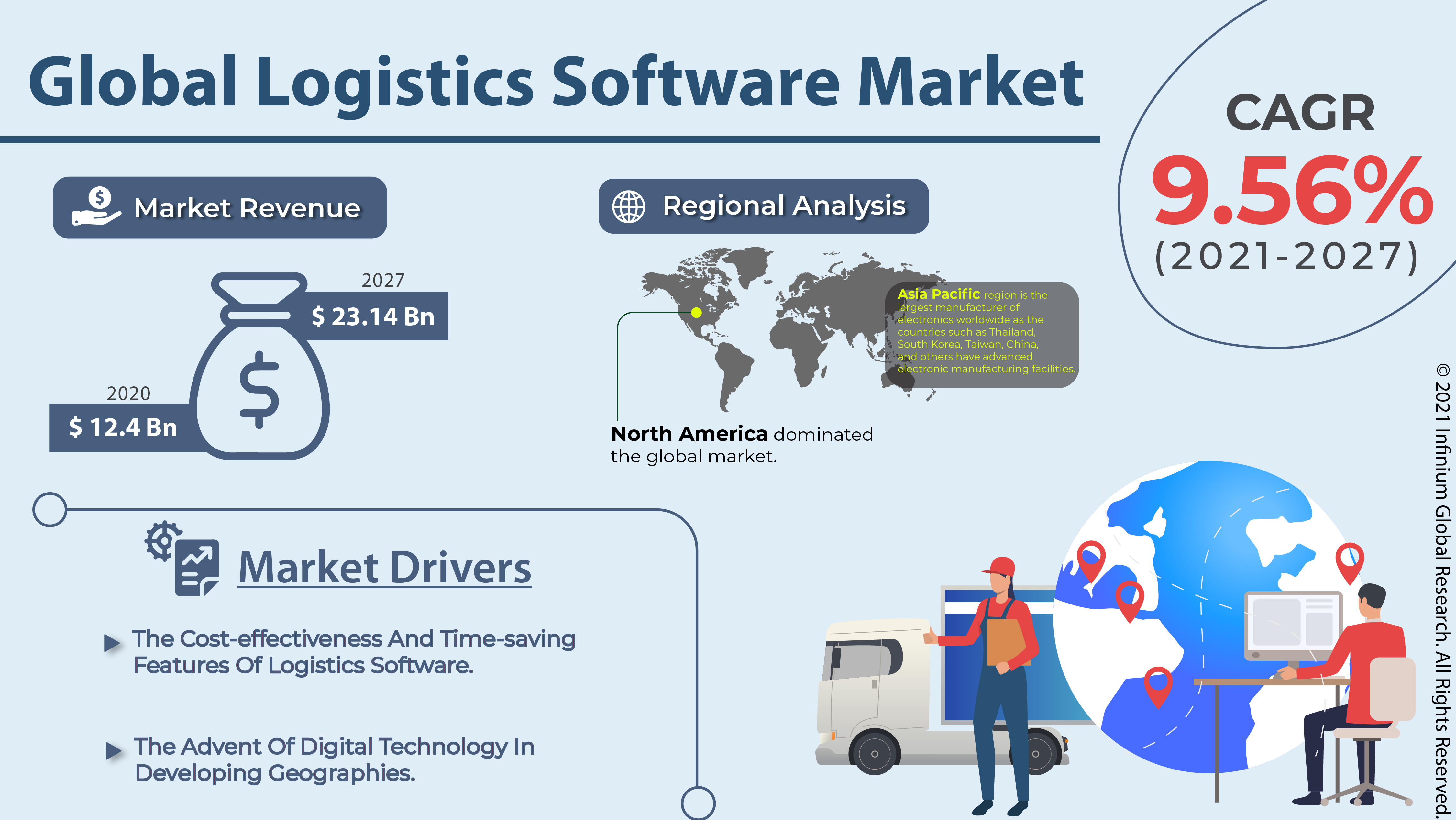Logistics Software Market (Deployment - On-premise, and Cloud; Application - Transportation Management, Warehouse Management, Asset & Fleet Management, Data Management, and Others; End User - Healthcare, Oil & Gas, Automotive, Telecommunication and IT, Government & Defense, and Others): Global Industry Analysis, Trends, Size, Share and Forecasts to 2027
A recent report published by
Infinium Global Research on the logistics software market provides an in-depth
analysis of segments and sub-segments in the global as well as regional
logistics software market. The study also highlights the impact of drivers,
restraints, and macro indicators on the global and regional logistics software
market over the short term as well as long term. The report is a comprehensive
presentation of trends, forecast and dollar values of the global logistics software
market. According to the report, the global logistics software market is
projected to grow at a CAGR of 9.56% over the forecast period of 2021-2027.

Market Insight
The logistics software market was
valued at USD 11.08 billion in 2020 and is expected to reach USD 15.76 billion
in 2027, with a CAGR of 9.56% during the forecast period. Nowadays, logistics
software is going through major changes that turn them in a different direction
overall. It is used in transport management, logistic management, warehouse
management, accounting management, vehicle/fleet management, inventory, and
several other applications. The scope of logistics as a function itself has
changed so dynamically and rapidly in the last decade.
The demand for logistics software
is increasing as it allows the integration of transportation, material
handling, packaging, inventory, and security associated with the supply chain
process. The software also helps to manage and schedule the mailing, shipping,
and tracking of packages, equipment, and letters. It enables logistics and
supply chain companies to leverage innovative technologies for superior
real-time fleet management, efficient communication, and better customer
service. The software is capable of integration with most existing business
applications as well as it helps to simplify the production cycles and make
them more accessible. It is ideal for any organization wanting to optimize its
operations and focus on Digital transformation and thriving digitally. However,
security and safety concern about logistics software hampers the market growth.
Moreover, the emergence of digital technology in developing regions is
providing growth opportunities to the market players. The effects of COVID-19 have been quick and
substantial on the global logistics software. The pandemic is shifting the
global dynamics and resulted in being a major disrupter. The application
industries are majorly affected by the coronavirus. Manufacturing companies
across the world are now focusing on developing plans to decrease the
aftershocks of this pandemic. The lockdown and restrictions by governments have
led to significant distress to supply bases, assembly plant closures, as well
as further downshift to the declining consumer demand.
Geographically, North America
dominated the global logistics software market in 2020 and is projected to
remain dominant during the forecast period owing to the rise in spending on
transportation & logistics. Asia-Pacific is expected to grow at the fastest
rate in the global logistics software market over the forecasted period. Asia-Pacific
region is the largest manufacturer of electronics worldwide as the countries
such as Thailand, South Korea, Taiwan, China, and others have advanced
electronic manufacturing facilities. China is known as the factory of the world
and the country holds the largest market share in the Asia-Pacific logistics
software market. Thus logistics and transportation play a huge role in this
region. This is expected to result in huge demand for logistics automation.
Segment Covered
The report on the global logistics
software market covers segments such as deployment, application, and end user.
On the basis of deployment, the sub-markets include on-premise, and cloud. On
the basis of application, the sub-markets include transportation management,
warehouse management, asset & fleet management, data management, and
others. On the basis of end user, the sub-markets include healthcare, oil &
gas, automotive, telecommunication and IT, government & defense, and
others.
Companies Profiled:
The report provides profiles of
the companies in the market such as Advantech Corporation, SAP AG, Tech
Mahindra, Digilogistics, Samsung Electronics Co, IBM Corporation, UTI Worldwide
Inc., Oracle, Hexaware Technologies, and JDA Software.
Report Highlights:
The report provides deep insights
into the demand forecasts, market trends, and micro and macro indicators. In
addition, this report provides insights into the factors that are driving and
restraining the growth in this market. Moreover, The IGR-Growth Matrix analysis
given in the report brings an insight into the investment areas that existing
or new market players can consider. The report provides insights into the
market using analytical tools such as Porter's five forces analysis and DRO
analysis of the logistics software market. Moreover, the study highlights current
market trends and provides forecast from 2021-2027. We also have highlighted
future trends in the market that will affect the demand during the forecast
period. Moreover, the competitive analysis given in each regional market brings
an insight into the market share of the leading players.
Request Quote